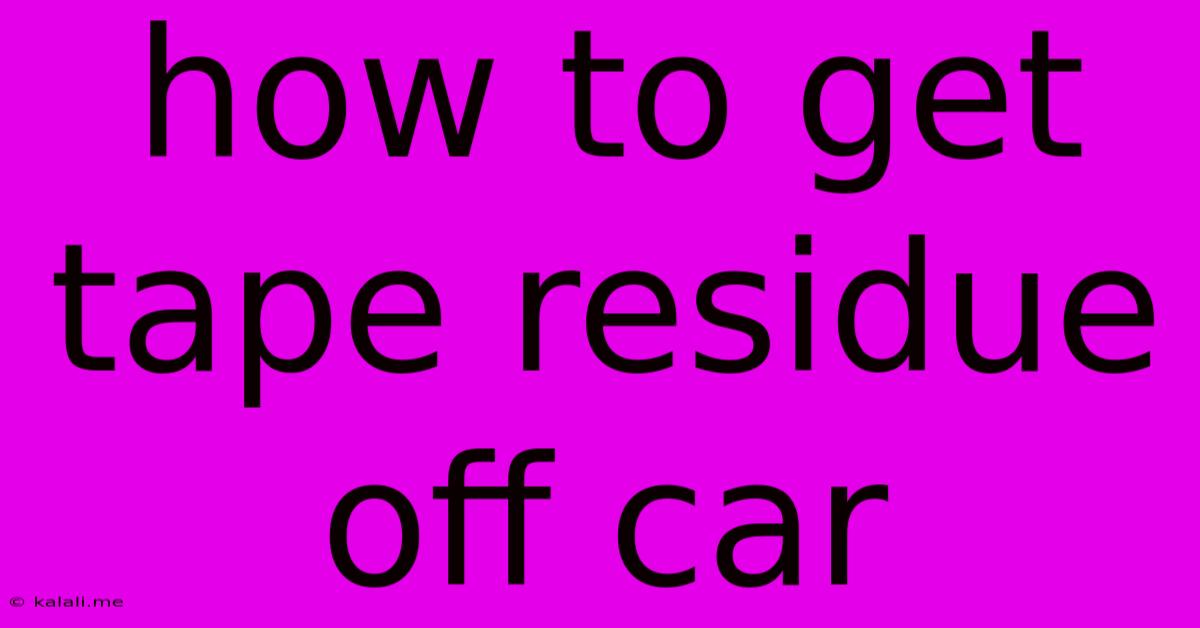How To Get Tape Residue Off Car
Kalali
Jun 02, 2025 · 3 min read

Table of Contents
How to Get Tape Residue Off Your Car: A Complete Guide
Removing stubborn tape residue from your car's paint can be frustrating, but with the right techniques and a little patience, you can get your car looking shiny and new again. This guide provides a comprehensive approach to tackling this common automotive cleaning challenge, covering various types of tape and residue. We'll explore several effective methods, from simple DIY solutions to more advanced techniques, ensuring you find the best solution for your specific situation.
Understanding the Enemy: Different Types of Tape Residue
The type of tape used dictates the best removal method. Different adhesives have varying levels of stickiness and chemical composition. Common culprits include masking tape, painter's tape, electrical tape, and even double-sided adhesive tape often used for decals or aftermarket accessories. Understanding this distinction is crucial for successful removal.
Easy Peasy Lemon Squeezy: Simple Removal Techniques
Before resorting to harsher chemicals, try these gentler methods first:
-
Warm Water and Soap: Often the most effective first step. Wash the affected area with warm, soapy water using a soft sponge or microfiber cloth. Gently scrub the residue, paying attention to avoid scratching the paint. Rinse thoroughly and dry with a clean microfiber cloth.
-
Isopropyl Alcohol (Rubbing Alcohol): A household staple with surprising cleaning power. Apply a small amount of isopropyl alcohol (70% or higher concentration) onto a clean microfiber cloth. Gently rub the residue until it softens and lifts. Always test on an inconspicuous area first. Rinse and dry thoroughly afterward.
Step Up Your Game: More Advanced Methods
If gentle methods fail, you may need to employ more aggressive techniques:
-
WD-40: A versatile product with surprisingly effective adhesive-removing properties. Spray a small amount onto a clean cloth, not directly onto the paint. Gently rub the residue. This method requires thorough rinsing and drying to prevent any residue buildup.
-
Goo Gone: Specifically designed for removing sticky residue, Goo Gone is a popular choice. Follow the product instructions carefully, applying a small amount and gently rubbing. Rinse and dry thoroughly.
-
Hair Dryer: The heat from a hair dryer can soften the adhesive, making it easier to remove. Hold the dryer a few inches away from the surface and gently heat the area. Use a plastic scraper or a dull butter knife (to avoid scratching) to carefully lift the softened residue. Immediately clean the area with a microfiber cloth and soapy water or isopropyl alcohol afterward.
Prevention is Better Than Cure: Tips for Avoiding Tape Residue
- Proper Tape Application: Apply tape carefully, ensuring a smooth, even surface contact.
- Choose the Right Tape: Opt for low-residue tapes designed for automotive use whenever possible.
- Clean Surfaces Before Applying Tape: Removing dirt and debris before applying tape prevents it from sticking too aggressively.
What to Avoid:
- Sharp objects: Avoid using sharp objects like razor blades or metal scrapers, as these can easily scratch your car's paint.
- Aggressive chemicals: Avoid using harsh chemicals or solvents that could damage the car's paint or clear coat.
- Leaving Residue: Always thoroughly clean the area after attempting any removal method to prevent further issues.
By following these tips and choosing the appropriate method based on the type and stubbornness of the residue, you can effectively remove tape residue from your car's paint and restore its pristine appearance. Remember, patience and a gentle approach are key to avoiding damage to your vehicle's finish.
Latest Posts
Latest Posts
-
Why Is My Cat Licking My Face
Jun 04, 2025
-
How To Tell If Baked Potato Is Done
Jun 04, 2025
-
How To Write Taking Timeoff For Working Overtime
Jun 04, 2025
-
How To Treat Cedar Wood For Outdoor Use
Jun 04, 2025
-
Can An Employer Hold Your W2 For Any Reason
Jun 04, 2025
Related Post
Thank you for visiting our website which covers about How To Get Tape Residue Off Car . We hope the information provided has been useful to you. Feel free to contact us if you have any questions or need further assistance. See you next time and don't miss to bookmark.